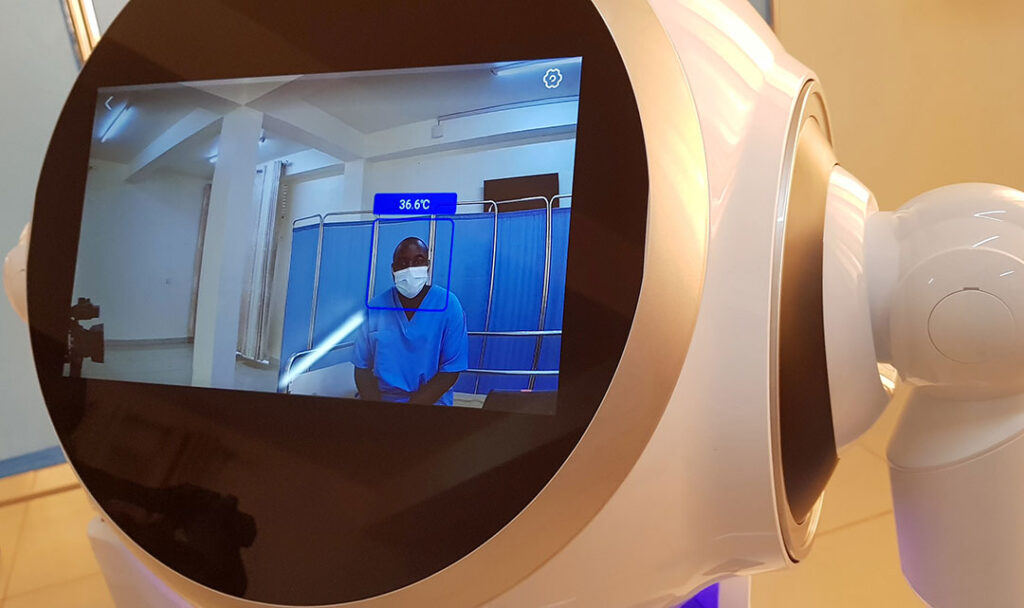ADF STAFF
The World Health Organization has praised Rwanda for its handling of the COVID-19 pandemic.
The country keeps infection rates and deaths relatively low through medical innovations, imaginative technology use and its government’s proactive response.
Despite Africa’s highest population density — including an estimated 150,000 refugees — Rwanda reported only 35 COVID-19 deaths as of October 28, according to the Africa Centres for Disease Control and Prevention.
“Rwanda has been running [an] all-of-government response to bring [the] COVID-19 outbreak under control, following the fundamentals from testing and contact tracing to wide use of public health measures,” WHO Director General Tedros Adhanom tweeted in late October.
Officials implemented a full lockdown and established a contact tracing system shortly after the first COVID-19 case was confirmed there in March.
A month after the virus was detected, the Rwanda National Police (RNP) began using drones to inform Kigali residents about the virus and enforce lockdown measures.
“RNP leadership considers drones as a powerful tool which supports law enforcement in conducting sensitization as well as various public safety-related operations, which include border control, environmental protection, response to disasters, public order management and support for investigations, among others,” police spokesman John Bosco Kabera told ADF.
As the virus spread slowly, Rwanda deployed five robots donated by the United Nations to help health workers treat COVID-19 patients.
Designed by a Belgian robotics company, the machines take patients’ temperatures, monitor their status, and deliver food and medication. The robots also are placed in bus terminals and other places where people congregate to do random tests and identify people with COVID-19 symptoms.
“It is exciting to see different institutions join hands to seek solutions to address COVID-19,” Health Minister Daniel Ngamije told Kigali Today. “It is yet another milestone in the use of technology to enhance health in Rwanda.”
Global shortages of surgical masks and personal protective equipment (PPE) spurred Rwandan companies to produce their own, Clare Akamanzi, executive director of the Rwanda Development Board, told Health Policy Watch. Rwandans also employed 3D printing to make face shields for health care workers.
Akamanzi said 76 Rwandan companies manufacture face masks, three make surgical masks and one produces PPE.
“All have been certified by the Rwanda Food and Drugs Authority,” she said.
Wilfred Ndifon, an epidemiological mathematician and director of research at the African Institute for Mathematical Sciences in Rwanda, recognized a scarcity of COVID-19 testing kits and used an algorithm to develop a fast, effective and inexpensive method of batch testing people for the virus.
Ndifon’s innovation, which can test up to 100 people simultaneously, earned global recognition.
“Because [batch] testing allows you to test many people, you can have a clearer picture of your epidemiological data profile,” Leon Mutesa, a member of the Rwandan government’s COVID-19 task force, told The Conversation Africa.
Batch testing in Rwanda mostly is done on people in markets, banks, prisons and other places where large groups gather. “It will also help to identify new infection hot spots to enable a rapid response by public health officials,” Mutesa added.
Rwanda used $3 million in U.S. donations to increase laboratory diagnostic capacity and biosafety, enhance central and district-level surveillance, prevent infection, and treat acute respiratory infections at Rwanda Biomedical Centre.
“I think for me what was clear is that Rwanda — they took this pandemic very seriously,” Youssef Travaly, vice president of the African Institute for Mathematical Sciences, told U.S. News & World Report. “They started monitoring the evolution of the pandemic in December, they were watching what was happening.”

